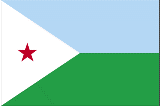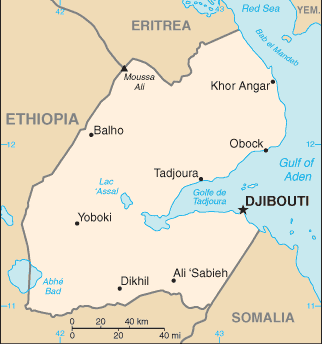|
Djibouti
|

|
Capital: Djibouti
Population: 973,560
Brief History of Djibouti:
Djibouti has been settled by nomadic tribal peoples for many thousands of years. The local ethnic groups of the Somali and Afar people adopted Islam early in their history and were part of the Ottoman Empire in the 1800s. After this the French took interest in the area and it soon became known as the French Territory of the Afars and the Issas.
In 1977 the country of Djibouti was born. The first president was Hassan Gouled who ruled until 1999 when the first multi-party elections were held. Ismail Omar Guelleh became the president at that time. During the 1990s the country was mired in a civil war between the Arars and the Issas.
Djibouti still has close ties to the French dating back to its colonial days. France keeps a fairly large army in the country. The area is considered strategic because of its location at the head of the Red Sea.
The Geography of Djibouti
Total Size: 23,000 square km
Size Comparison: slightly smaller than Massachusetts
Geographical Coordinates: 11 30 N, 43 00 E
World Region or Continent: Africa
General Terrain: coastal plain and plateau separated by central mountains
Geographical Low Point: Lac Assal -155 m
Geographical High Point: Moussa Ali 2,028 m
Climate: desert; torrid, dry
Major cities: DJIBOUTI (capital) 567,000 (2009)
The People of Djibouti
Type of Government: republic
Languages Spoken: French (official), Arabic (official), Somali, Afar
Independence: 27 June 1977 (from France)
National Holiday: Independence Day, 27 June (1977)
Nationality: Djiboutian(s)
Religions: Muslim 94%, Christian 6%
National Symbol:
National Anthem or Song: Jabuuti (Djibouti)
Economy of Djibouti
Major Industries: construction, agricultural processing, salt
Agricultural Products: fruits, vegetables; goats, sheep, camels, animal hides
Natural Resources: geothermal areas, gold, clay, granite, limestone, marble, salt, diatomite, gypsum, pumice, petroleum
Major Exports: reexports, hides and skins, coffee (in transit)
Major Imports: foods, beverages, transport equipment, chemicals, petroleum products
Currency: Djiboutian franc (DJF)
National GDP: $2,231,000,000
** Source for population (2012 est.) and GDP (2011 est.) is CIA World Factbook.
Back to Geography Home Page
